Trends and Statistics of Persecution Cases in 2013 (Part 2)
(Minghui.org) Continued from Part 1 - Trends and Statistics of Persecution Cases in 2013 (Part 1)
The persecution of Falun Gong continued throughout China in 2013. The methods of persecution include unlawful ransacking of homes, kidnappings, detention, imprisonment in forced labor camps, torture, fabrication of false charges, interrogation, and sentencing into prisons without criminal evidence. As the notorious forced labor camp system was shut down in name, the 610 Office continued using unlawful detention and brainwashing to persecute Falun Gong practitioners.
This report is a summary of the persecution in 2013 based on data from Minghui.org as of January 3, 2014.
From January 1 to December 31, 2013, the following were reported:
- 108 Falun Gong practitioners were confirmed in 2013 to have died due to the persecution, including 74 who died in 2013 and 34 before 2013
- At least 4,942 practitioners were forcibly taken away by police
- At least 16 practitioners were unlawfully imprisoned in forced labor camps
- At least 737 practitioners were detained for brainwashing by 610 Offices
- At least 796 practitioners were unlawfully tried and sentenced to prison
In other words, in 2013 on average:
- 6 practitioners were died as a result of persecution every month
- 27 practitioners were arrested every two days
- 2 practitioners were taken to brainwashing centers every day
- 12 practitioners were sentenced or tried every six days
The actual numbers are likely much larger than the confirmed ones, due to the difficulty of getting information out of China. The data in this article is just a small part of what happened in 2013.
Section I. 108 Newly Confirmed Death Cases Due to the Persecution
1. 74 Falun Gong Practitioners Died Due to the Persecution in 2013
There were 74 Falun Gong practitioners who died in 2013 due to the persecution, including 33 male practitioners, 45% of the total, and 41 female practitioners, 55% of the total. There were 68 cases with information of age at death. Please see more details in Figure 1 and 2.
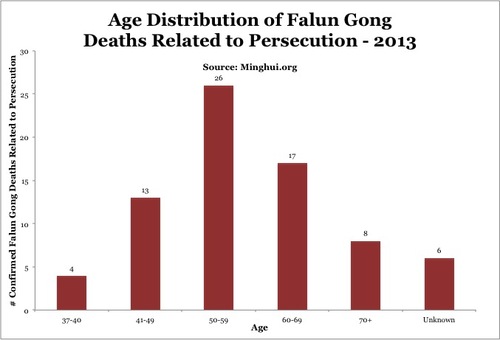 Figure 1. Age distribution of Falun Gong practitioners who have died due to the persecution in 2013. (Source: Minghui.org)
Figure 1. Age distribution of Falun Gong practitioners who have died due to the persecution in 2013. (Source: Minghui.org)
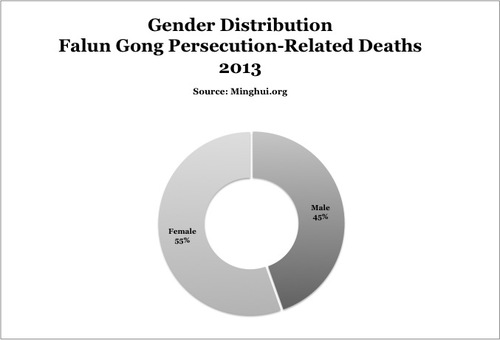 Figure 2. Gender distribution of Falun Gong practitioners died due to the persecution in 2013. (Source: Minghui.org)
Figure 2. Gender distribution of Falun Gong practitioners died due to the persecution in 2013. (Source: Minghui.org)
Among the 74 practitioners who died in 21 provinces or direct-controlled municipalities in 2013, 8 took place in Shandong Province, 7 in Liaoning, 5 in Jilin, 5 in Heilongjiang, 6 in Sichuan, 5 in Hebei, 5 in Beijing, 4 in Henan, 4 in Guangdong, 4 in Yunnan, 3 in Hunan, 3 in Anhui, 3 in Jiangsu, 3 in Inner Mongolia, 2 in Hubei, 2 in Shanghai, 1 in Shanxi, 1 in Gansu, 1 in Jiangxi, 1 in Qinghai, and 1 in Guizhou.
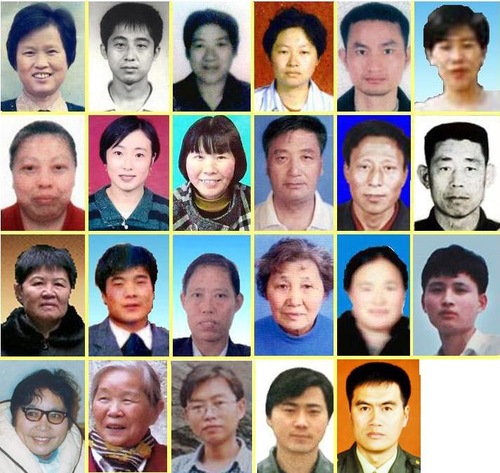 Figure 3. Photos of several Falun Gong practitioners who died due to the persecution in 2013 (Source: Minghui.org). They are (from left to right, and top to bottom): Shan Muzhi (Jiangxi), Deng Huaiying (Beijing), Liu Rongxiang (Heilongjiang), Jiang Zhaofang (Henan), Zeng Haiqi (Hunan), Wu Shuyan (Liaoning), Lei Jinxiang (Sichuan), Wang Mingyun (Shandong), Liu Xinlan (Hubei), Du Wenfu (Heilongjiang), Liu Zhanyu (Inner Mongolia), Wu Ruixiang (Hebei), Zhang Fuying (Guangdong), Qian Fajun (Shandong), Guo Boqin (Hunan), Jiang Cuiping (Anhui), Liu Shuhua (Shandong), Yang Zhonggeng (Zhejiang), Yan Zengfang (Sichuan), Chen Lianfang (Guangdong), Li Jinpeng (Beijing), Cao Jingyu (Hubei), Zhao Bin (Shanghai).
Figure 3. Photos of several Falun Gong practitioners who died due to the persecution in 2013 (Source: Minghui.org). They are (from left to right, and top to bottom): Shan Muzhi (Jiangxi), Deng Huaiying (Beijing), Liu Rongxiang (Heilongjiang), Jiang Zhaofang (Henan), Zeng Haiqi (Hunan), Wu Shuyan (Liaoning), Lei Jinxiang (Sichuan), Wang Mingyun (Shandong), Liu Xinlan (Hubei), Du Wenfu (Heilongjiang), Liu Zhanyu (Inner Mongolia), Wu Ruixiang (Hebei), Zhang Fuying (Guangdong), Qian Fajun (Shandong), Guo Boqin (Hunan), Jiang Cuiping (Anhui), Liu Shuhua (Shandong), Yang Zhonggeng (Zhejiang), Yan Zengfang (Sichuan), Chen Lianfang (Guangdong), Li Jinpeng (Beijing), Cao Jingyu (Hubei), Zhao Bin (Shanghai).
2. Newly Documented: 34 Practitioners Who Died Due to the Persecution before 2013
Newly documented cases of 34 practitioners who died due to the persecution before 2013 include 15 male and 19 female practitioners and involve 18 provinces or direct-controlled municipalities.
Among the 34 cases, 6 were in Shandong Province, 6 in Hunan, 3 in Heilongjiang, 2 in Sichuan, 2 in Jilin, 2 in Liaoning, 2 in Beijing, 1 in Fujian, 1 in Guangdong, 1 in Hubei, 1 in Guangxi, 1 in Ningxia, 1 in Guizhou, 1 in Hebei, 1 in Zhejiang, 1 in Henan, 1 in Inner Mongolia, and 1 in Xinjiang.
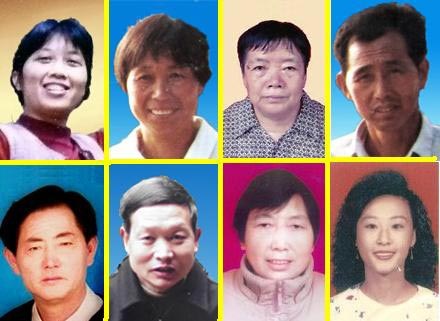 Figure 4. Several of the newly documented practitioners who died due to the persecution before 2013 (Source: Minghui.org). They are (from left to right, and up to down): Huang Yuanran (Guangxi), Shi Fengzhi (Shandong), Song Meilan (Guizhou), Wang Mingli (Shandong); Chen Baihe (Hebei), Wei Chaohai (Sichuan), Wang Wuhui (Hunan), Zhang Xihong (Liaoning).
Figure 4. Several of the newly documented practitioners who died due to the persecution before 2013 (Source: Minghui.org). They are (from left to right, and up to down): Huang Yuanran (Guangxi), Shi Fengzhi (Shandong), Song Meilan (Guizhou), Wang Mingli (Shandong); Chen Baihe (Hebei), Wei Chaohai (Sichuan), Wang Wuhui (Hunan), Zhang Xihong (Liaoning).
3. Causes of Death
Among the 74 practitioners who died in 2013, 13 were due to the trauma of long term surveillance, harassment, intimidation and unlawful confiscation of possessions; 32 were tortured to death in prisons; 14 were died in forced labor camps; 6 were tortured to death in brainwashing centers; and 9 were tortured to death by police interrogation or detention centers (Figure 5).
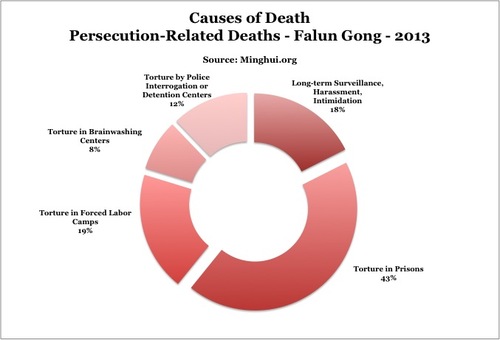 Figure 5. Causes of death for practitioners who died due to the persecution in 2013 (Source: Minghui.org).
Figure 5. Causes of death for practitioners who died due to the persecution in 2013 (Source: Minghui.org).
Section II. 4,942 Falun Gong Practitioners Kidnapped in 2013
1. Monthly Distribution of the 4,942 Practitioners Forcibly Taken Away
Kidnapping of Falun Gong practitioners by police, government officials or secret agents happened on a daily basis in China. In 2013, at least 4,942 practitioners were forcibly taken away (Figure 6). The monthly distribution is shown in Figure 6.
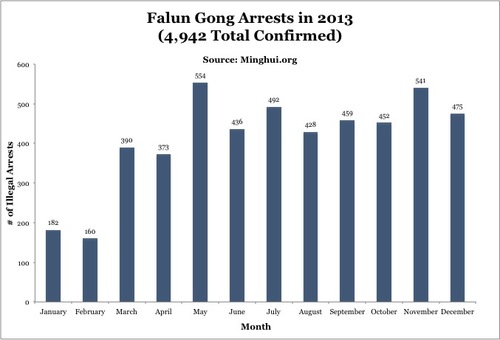 Figure 6. Monthly distribution of Falun Gong practitioners who were forcibly taken away by CCP police, government officials or secret agents (Source: Minghui.org).
Figure 6. Monthly distribution of Falun Gong practitioners who were forcibly taken away by CCP police, government officials or secret agents (Source: Minghui.org).
2. Regional Distribution of Falun Gong Practitioners Forcibly Taken Away
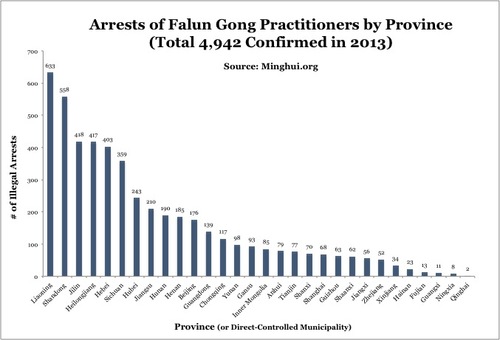 Falun Gong practitioners were forcibly taken away in 2013 in all provinces, regions or direct-control municipalities except for Tibet (Figure 7).
Falun Gong practitioners were forcibly taken away in 2013 in all provinces, regions or direct-control municipalities except for Tibet (Figure 7).
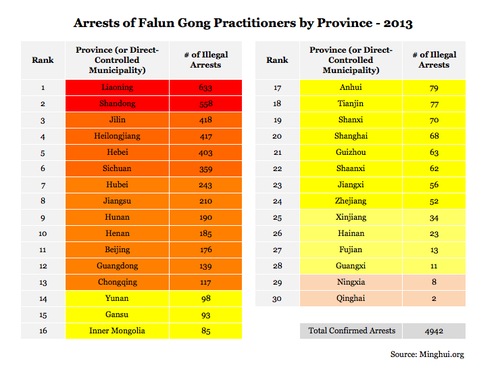 Figure 7. Regional distribution of the Falun Gong practitioners forcibly taken away in 2013 (Source: Minghui.org).
Figure 7. Regional distribution of the Falun Gong practitioners forcibly taken away in 2013 (Source: Minghui.org).
Among the practitioners who were forcibly taken away in 2013, 633 were in Liaoning Province; 558 in Shandong; 418 in Jilin; 417 in Heilongjiang; 403 in Hebei; 359 in Sichuan; and 243 in Hubei. From the data above, we can see that 27 practitioners were forcibly taken away in China every two days.
3. City-level Distribution (Major cities, not including direct control municipalities) of Falun Gong Practitioners Having Been Forcibly Taken away
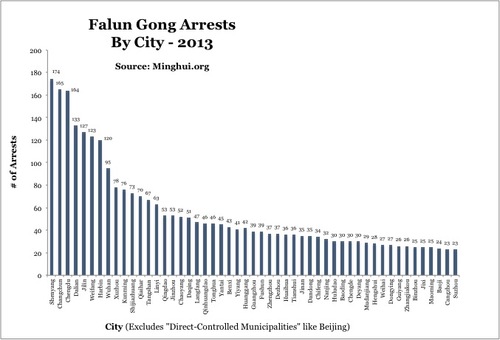
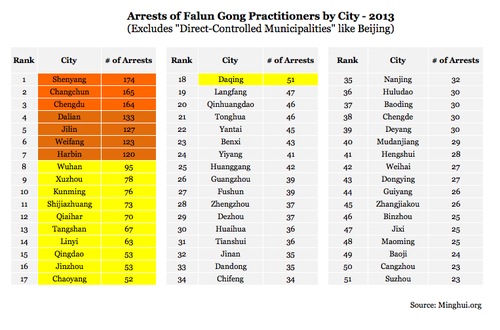 Figure 8. City-level distribution (major regional cities, not including municipalities) of Falun Gong practitioners forcibly taken away in 2013 (Source: Minghui.org).
Figure 8. City-level distribution (major regional cities, not including municipalities) of Falun Gong practitioners forcibly taken away in 2013 (Source: Minghui.org).
Figure 8 shows the number of practitioners who were forcibly taken away. The highest number is from Shenyang, followed by Changchun, Chengdu, Dalian, Jilin, Weifang, Harbin, Wuhan, Xuzhou, Kunming, Shijiazhuang, Qiqihar, Tangshan, Linyi, Qingdao, Jinzhou, Chaoyang, Daqing in descending order. Among the 20 cities with the highest numbers of practitioners who were forcibly taken away, 9 were in Northeast China, 4 in East China, 4 in North China, 1 in Central China, and 2 in Southwest China.
Section III. Summary of Practitioners Sent to Forced Labor Camps or Sentenced to Prisons
Figure 9 shows the number of Falun Gong practitioners who were sent to forced labor camps or sentenced to prisons via unlawful trials in 2013. At least 16 were sent to forced labor camps. At least 796 were sentenced to prison.
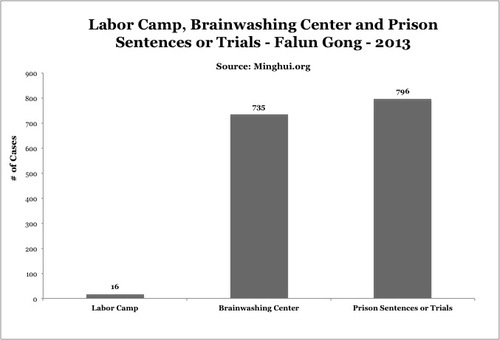 Figure 9. Number of Falun Gong practitioners who were sent to forced labor camps or sentenced to prisons (Source: Minghui.org).
Figure 9. Number of Falun Gong practitioners who were sent to forced labor camps or sentenced to prisons (Source: Minghui.org).
1. Sixteen Practitioners Sent to Forced Labor Camps
A total of 16 practitioners were sent to forced labor camps in 2013. Among them, 6 were in Beijing, 3 in Shandong, 3 in Guangdong, 2 in Hubei, 1 in Heilongjiang, and 1 in Jilin.
2. 796 Practitioners Sentenced to Prison
796 Falun Gong practitioners from 28 provinces or municipalities except Tibet, Qinghai and Guangxi were sentenced to prison in 2013 (Figure 10). At least 19 practitioners were prison sentences of ten years or longer.
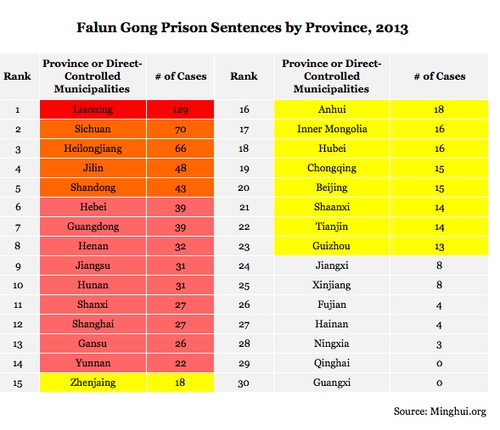
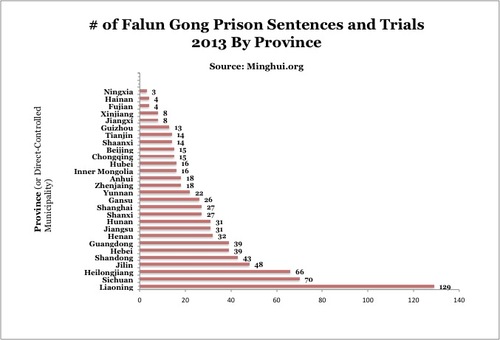 Figure 10. Regional distribution of Falun Gong practitioners who were sentenced to prison in 2013 (Source: Minghui.org).
Figure 10. Regional distribution of Falun Gong practitioners who were sentenced to prison in 2013 (Source: Minghui.org).
Figure 10 shows that Liaoning Province had the highest number (129) of practitioners sentenced to prison in 2013, followed by Sichuan, Heilongjiang, Jilin, Shandong, Hebei, Guangdong, Henan, Jiangsu, Hunan, Shanxi, Shanghai, Gansu, and Yunnan in descending order.
Figure 11 shows the length distribution of the 484 unlawful prison sentences: 333 (69%) were sentenced to 4 years or less; 110 (23%) to 5-7 years; 41 (8%) to 8-years or more.
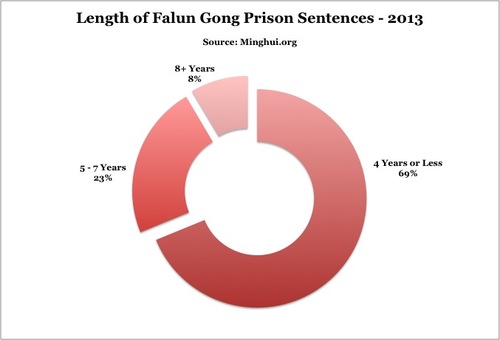
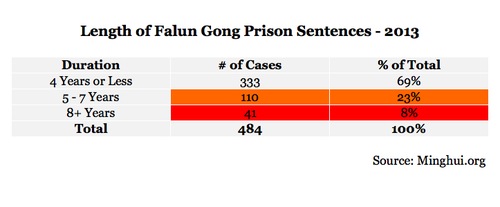 Figure 11. Terms of the 484 Falun Gong practitioners given illegal prison sentences in 2013 (Source: Minghui.org).
Figure 11. Terms of the 484 Falun Gong practitioners given illegal prison sentences in 2013 (Source: Minghui.org).
Section IV. Summary of Falun Gong Practitioners Who Were Subjected to Brainwashing Sessions by 610 Offices
1. 737 Falun Gong Practitioners Were Subjected to Brainwashing in 2013
At least 737 Falun Gong practitioners were forcibly taken to brainwashing sessions, where they are pressured to renounce their belief. Among them, 20 people were taken in January, 5 in February, 27 in March, 49 in April, 78 in May, 56 in June, 95 in July, 96 in August, 73 in September, 128 in October, 77 in November, and 33 in December (Figure 12).
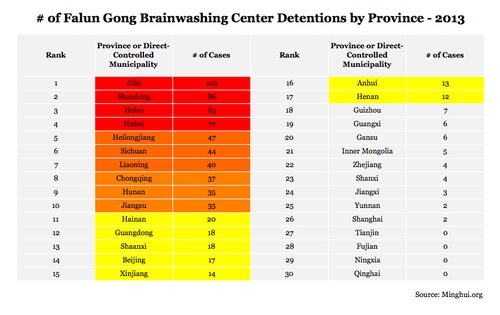
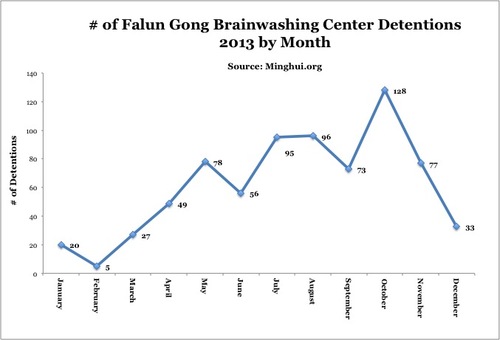 Figure 12. Summary of Falun Gong practitioners forcibly taken to brainwashing sessions in 2013 (Source: Minghui.org).
Figure 12. Summary of Falun Gong practitioners forcibly taken to brainwashing sessions in 2013 (Source: Minghui.org).
2. 157 Brainwashing Sessions in 27 Provinces in 2013
There were a total of 157 brainwashing sessions, often spanning multiple days, held by 610 Offices in 27 provinces. Among the 157 known sessions, 24 were in Shandong Province, 17 in Hubei, 13 in Heilongjiang, 12 in Jilin, 10 in Hebei, 9 in Sichuan, 9 in Hunan, 8 in Jiangsu, 8 in Beijing, 6 in Guangdong, 6 in Henan, 5 in Chongqing, 4 in Liaoning, 5 in Inner Mongolia, 5 in Shaanxi, 3 in Xinjiang, 2 in Guangxi, 2 in Shanghai, 2 in Gansu, 1 in Anhui, 1 in Guizhou, 1 in Hainan, 1 in Jiangxi, 1 in Shanxi, 1 in Yunnan, and 1 in Zhejiang (Figure 13).
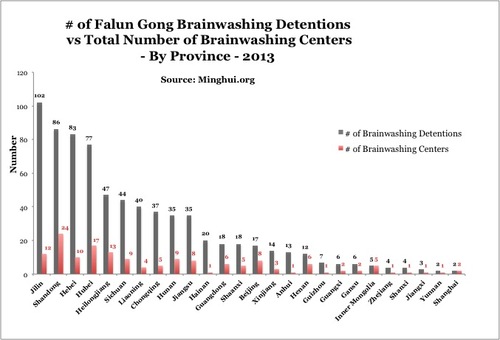 Figure 13. Regional distribution of brainwashing sessions held by 610 Offices in 2013 to force Falun Gong practitioners to renounce their belief (Source: Minghui.org)
Figure 13. Regional distribution of brainwashing sessions held by 610 Offices in 2013 to force Falun Gong practitioners to renounce their belief (Source: Minghui.org)
Based on the data provided, the persecution of Falun Gong is most severe in these provinces: Liaoning, Shandong, Heilongjiang, Jilin, Hebei, and Sichuan, followed by Henan, Jiangsu, Hunan, Hubei and Guangdong Province.